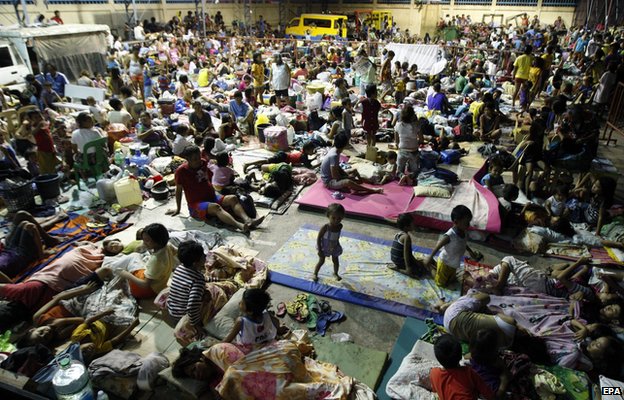
BBC Online : About half a million people have fled coastal villages and evacuated their homes in the Philippines as a powerful storm approaches the archipelago. Typhoon Hagupit, which weakened slightly on Friday night, is due to make landfall on Saturday evening. It is on course for the Eastern and Northern Samar provinces and the city of Tacloban, where thousands were killed by Typhoon Haiyan a year ago. It has weakened slightly but gusts are still peaking at 195km/h (120mph). Thousands of passengers were left stranded after Philippine Airlines and Cebu Pacific cancelled more than 150 flights to the central and southern Philippines on Friday and Saturday, and sea travel services were suspended. ‘Massive scale’ The BBC’s Jonathan Head in the capital Manila said the Philippines was experiencing one of its largest ever peacetime evacuations. He said people were being moved to higher ground and into more solid buildings such as churches, schools and sports stadiums. However, no-one is sure where the worst affected places will be because typhoons change direction and intensity, our correspondent adds. President Benigno Aquino, who met disaster agency chiefs on Friday afternoon, has ordered food supplies to be sent to affected areas as well as troops and police to be deployed to prevent looting in the aftermath. Local media reported Mr Aquino as saying there was “no indication” for now that Hagupit, would be as strong as Haiyan. Haiyan – known as Yolanda in the Philippines – was the most powerful typhoon ever recorded over land. It tore through the central Philippines in November 2013, leaving more than 7,000 dead or missing. Hagupit’s huge diameter of 600km (370 miles) meant that about 50 million people, or half the nation’s population, were living in vulnerable areas, Social Welfare Secretary Corazon Soliman told AFP news agency.

